

Stress hormones and eating disorders. Highlights There are markers of the maltreated ecophenotype among people with EDs.
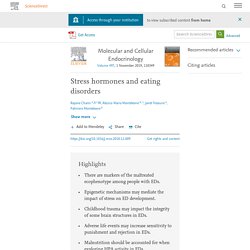
Epigenetic mechanisms may mediate the impact of stress on ED development. Childhood trauma may impact the integrity of some brain structures in EDs. Adverse life events may increase sensitivity to punishment and rejection in EDs. Malnutrition should be accounted for when exploring HPA activity in EDs. Abstract Aims The aim of this paper is to emphasize the role of stress processes in the aetiology of eating disorders. Methods We have examined the literature for evidence that people with eating disorders might exhibit markers of stress and show signs of the “maltreated ecophenotype”. Results Early adversity is more common among people with binge eating behaviours. View full text. Emotional Eating. Healthy eating Do you eat to feel better or relieve stress?
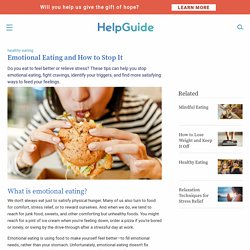
These tips can help you stop emotional eating, fight cravings, identify your triggers, and find more satisfying ways to feed your feelings. What is emotional eating? We don’t always eat just to satisfy physical hunger. Many of us also turn to food for comfort, stress relief, or to reward ourselves. Emotional eating is using food to make yourself feel better—to fill emotional needs, rather than your stomach. Are you an emotional eater? Do you eat more when you’re feeling stressed? The emotional eating cycle Occasionally using food as a pick-me-up, a reward, or to celebrate isn’t necessarily a bad thing. Emotional hunger can’t be filled with food. Birmingham City University - Sign In. 7 Foods to Improve Your Mental Health and Wellness. “You are what you eat” – every person at least once in their life.
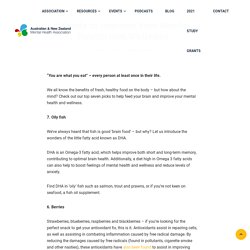
We all know the benefits of fresh, healthy food on the body – but how about the mind? Check out our top seven picks to help feed your brain and improve your mental health and wellness. 7. Oily fish We’ve always heard that fish is good ‘brain food’ – but why? DHA is an Omega-3 fatty acid, which helps improve both short and long-term memory, contributing to optimal brain health. Find DHA in ‘oily’ fish such as salmon, trout and prawns, or if you’re not keen on seafood, a fish oil supplement. 6. Strawberries, blueberries, raspberries and blackberries – if you’re looking for the perfect snack to get your antioxidant fix, this is it.
As an added bonus, berries (blueberries and strawberries) also contain a compound called polyphenolics, which have been found to improve memory, concentration and attention span. 5. 4. There’s a reason carbs are so delightful – and they don’t have to take a back seat in your daily diet. Depression Food Traps: Eating Too Much, Eating Too Little, and Unhealthy Choices. Diet and depression. Just this week, I have seen three patients with depression requiring treatment.
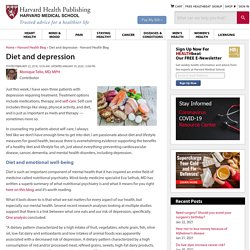
Treatment options include medications, therapy, and self-care. Self-care includes things like sleep, physical activity, and diet, and is just as important as meds and therapy — sometimes more so. In counseling my patients about self-care, I always feel like we don’t have enough time to get into diet. I am passionate about diet and lifestyle measures for good health, because there is overwhelming evidence supporting the benefits of a healthy diet and lifestyle for, oh, just about everything: preventing cardiovascular disease, cancer, dementia, and mental health disorders, including depression. Diet and emotional well-being Diet is such an important component of mental health that it has inspired an entire field of medicine called nutritional psychiatry. What it boils down to is that what we eat matters for every aspect of our health, but especially our mental health.
Which comes first? The bottom line Resources. Nutritional psychiatry: Your brain on food. Think about it.
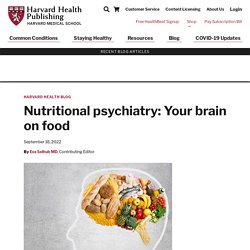
Your brain is always “on.” It takes care of your thoughts and movements, your breathing and heartbeat, your senses — it works hard 24/7, even while you’re asleep. This means your brain requires a constant supply of fuel. That “fuel” comes from the foods you eat — and what’s in that fuel makes all the difference.